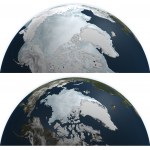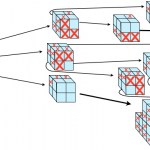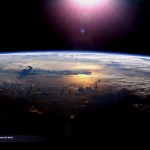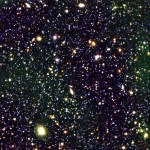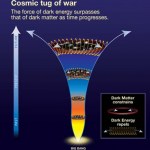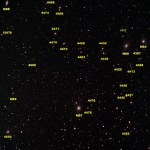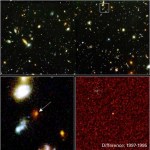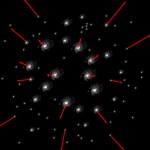expansion
"Some say the world will end in fire,
Some say in ice.
From what I've tasted of desire
I hold with those who favor fire.
But if it had to perish twice,
I think I know enough of hate
To say that for destruction ice
Is also great
And would suffice." -Robert Frost
Depending on where you are in the world right now, you might really be feeling the effects of the emerging winter, as cold snaps, freezes and snowstorms take hold across the northern hemisphere.
Image credit: NASA's Scientific Visualization Studio, Goddard Space Flight Center.
But we can all be pretty sure that this is temporary,…
“Light thinks it travels faster than anything but it is wrong. No matter how fast light travels, it finds the darkness has always got there first, and is waiting for it.” -Terry Pratchett
It’s the end of the week once again, and so let's have a go at another Ask Ethan! Perhaps inspired by a great giveaway, there have been so many great questions pouring in (and you can submit yours here for four more chances to win), but this week’s comes from our reader and winner Brad (you owe me your email address, Brad), who asks,
When an object is quoted as being 13.8 billion light years…
“The aim of science is not to open the door to infinite wisdom, but to set a limit to infinite error.” -Bertolt Brecht
One of the most frequent questions I get about the Universe -- as a cosmologist -- isn't quite about the Big Bang in and of itself.
The expansion of the Universe in reverse; image source unknown.
The Big Bang is a remarkable idea, of course, that says that, based on the observations that the Universe is expanding and cooling today, it was hotter, denser, and physically smaller in the past. This gets particularly exciting when we extrapolate very far back in the history…
"Not even light can escape such hollowing, this huge mass in a small space. Even the Milky Way with its open arms is said to have a black hole at its heart." -Susan B.A. Somers-Willett
Our Milky Way is home to us all. With its hundreds of billions of stars, massive spiral arms, dust lanes, and orbiting globular clusters, it's no wonder that nearly everything we see in the night sky is contained within it.
Image credit: All rights reserved by Flickr user Greg Booher.
I say nearly everything, of course, because there are a few exceptions. The Andromeda Galaxy, for one, as well as…
"How old would you be if you didn't know how old you are?" -Satchel Paige
Today marks another year and another trip around the Sun for me. For you, and me, and everything on Earth that makes it through another year on this world, there's a whole lot we get to experience.
Image credit: NASA / ISS Expedition 13.
Some things are tiny: the Earth's rotation slows by about two millionths of a second each year, while some are large: we hurtle over 900 million kilometers in outer space as we orbit around the Sun. Our Earth spins just over 366 times on its axis, while our one revolution around…
"Nothing exists except atoms and empty space; everything else is just opinion." -Democritus of Abdera
When you take a look out at the Universe, past the objects in our own solar system, beyond the stars, dust and nebulae within our own galaxy, and out into the void of intergalactic space, what is it that you see?
Image credit: BRI composite-image of the FORS Deep Field, ESO, VLT.
What we normally think of as the entire Universe, consisting of hundreds of billions of galaxies, with about 8,700 identified in the tiny patch of deep-sky shown above. Each one of those galaxies, itself…
Toads are an evolutionary success story. In a relatively short span of time, they diversified into around 500 species and spread to every continent except Antarctica. Now, Ines van Bocxlaer from Vrije University has uncovered the secrets of their success. By comparing the most home-bound toads with the most invasive ones, she has outlined seven qualities that enabled these amphibians to conquer the world. In a common ancestor, these seven traits came together to create an eighth - a pioneer's skill are colonising new habitats.
Some, like the harlequin toads, are restricted to such narrow…
When I think of molecules, I think of Conan O'Brien doing his skit where he plays Moleculo...
the molecular man! I don't think of astronomy, and I certainly don't think of the leftover radiation from the big bang (known as the cosmic microwave background)! But somebody over at the European Southern Observatory put these two together and made an incredibly tasty science sandwich.
See, we can measure the cosmic microwave background today, because we have photons (particles of light) coming at us in all directions at all locations, with a temperature of 2.725 Kelvin. Theoretical cosmology…
So, what's the deal with this one? startswithabang.com reader Scott Stuart asks the following question:
I was reading "The First Three Minutes" last night and came across an
interesting section about blackbody radiation and energy density. The
author states that as the universe expands, the number of photons
running around (in the CMB, for example) is unchanged, but their
wavelengths get stretched. The energy in a photon is, of course,
inversely proportional to its wavelength, so the energy content of a
photon decreases as its wavelength increases. That seems to mean that
the total energy…
In a comment on my last post, What is Dark Energy, Kendall asks the following, which is such a good one I think it deserves its own post:
I thought the expansion was accelerating? Aren’t you saying that it is on its way down to 85% of its current rate? Sounds like expansion is slowing, but still leaves us with an open universe…
People do say the expansion of the Universe is accelerating. But that doesn't mean that the expansion rate is accelerating. It means that if you take a look at any one galaxy that isn't gravitationally bound to us in the Local Group (that is, any big galaxy that isn't…
You've all heard these words before. Dark Energy. But what is it, and why are we stuck with it? Let me start by telling you a story.
Imagine, for a minute, that you have a candle. You know everything about this candle, including how bright it is and how far away it is from you. Like so:
Now if I move this candle twice as far away, I know it's going to be one-fourth as luminous. If I move it three times as far away, I know it's going to appear one-ninth as luminous. And if I move it a thousand times farther away, I know what I see is going to be one-millionth as luminous as the original…
Aaah, the Virgo cluster. A huge cluster of hundreds of galaxies, and our closest large neighbor in the Universe. People have known for a long time that although Virgo is still redshifting away from us, it isn't quite as fast as we would expect from the Hubble expansion rate of the Universe. Does this mean that we're gravitationally bound to it, and some day, we'll move into this dee-luxe apartment in the sky?
Nope. Dark energy is here to push it away from us, and we'll unfortunately see this bright neighbor recede farther and farther from us, until it disappears from our sight. So say your…
Sure, there's dark energy, but what does that really mean? First off, there's the bizarre phenomenon we see: very distant objects appear dimmer than we expect in a Universe filled with just matter and space. This supernova (above) should appear much brighter for how distant it is, based on what we know about supernova. This means one of three things are going on:
Supernova were intrinsically different when they were younger, and inherently fainter.
Some type of dust is blocking the light from distant supernova, making them seem fainter.
These supernova are actually farther away than we had…
The Universe isn't a static place. Although the laws of nature (physics, chemistry, biology, etc.) don't appear to change over time, everything in the Universe appears to evolve, and changes over time. One of the simplest ways that this happens is through Hubble expansion.
General relativity tells us how the Universe expands, and more specifically, it tells us that the expansion rate (which we call the Hubble constant, H0) is related to the total energy density of the Universe. More matter density: faster expansion. Greater density of photons (i.e., light): faster expansion. More of any and…
